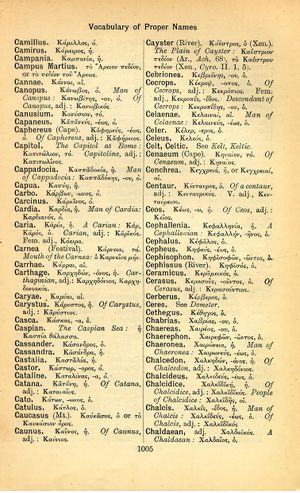Caryae
καλῶς γέ μου τὸν υἱὸν ὦ Στιλβωνίδη εὑρὼν ἀπιόντ' ἀπὸ γυμνασίου λελουμένον οὐκ ἔκυσας, οὐ προσεῖπας, οὐ προσηγάγου, οὐκ ὠρχιπέδισας, ὢν ἐμοὶ πατρικὸς φίλος → Ah! Is this well done, Stilbonides? You met my son coming from the bath after the gymnasium and you neither spoke to him, nor kissed him, nor took him with you, nor ever once felt his balls. Would anyone call you an old friend of mine?
English > Greek (Woodhouse)
Καρύαι, αἱ.
Latin > English (Lewis & Short)
Căryae: ārum, f., = Καρύαι,
I a village in Laconia, with a temple of Diana Caryatis (now still Karyes), Liv. 34, 26, 9; 35, 27, 12. —In sing.: Cărya, Vitr. 1, 1, 5.—
II Hence,
A Căryātes, ium, m., the inhabitants of Caryœ, Vitr. 1, 1 bis.—
B Căryā-tis, ĭdis, f., = Καρυᾶτις.
1 An epithet of Diana, Serv. ad Verg. E. 8, 30.—
2 Căry-ātĭdes, the maidens of Caryœ serving in the temple of Diana, a statue of Praxiteles, Plin. 36, 5, 4, § 23.—
(b) In architecture, female figures used instead of columns in buildings, Caryatides, Vitr. 1, 1, 5 (v. the representation of such a Caryatide from the temple of Pallas Polias, at Athens, in O. Müller, Denkm. d. alt. Kunst, 101, and Dict. of Antiq.).—
3 Căryus, a, um, adj., of Caryœ: Diana, Stat. Th. 4, 225.
Latin > French (Gaffiot 2016)
Cărўæ, ārum, f., bourg de Laconie : Liv. 34, 36, 9.
Latin > German (Georges)
Caryae, ārum, f. (Καρύαι), ein Flecken in Lakonien, mit einem Tempel der Artemis (Diana), noch j. (nach Pouqu.) Karyes, Vitr. 1, 1, 5. Liv. 34, 36, 9; 35, 27, 13. – Dav.: A) Caryātēs, ium, m., die Einw. von Karyä, die Karyaten, Vitr. 1, 1, 5. – B) Caryātis, tidis, f. (Καρυατις), a) Beiname der Artemis (Diana), Serv. Verg. ecl. 8, 30. – b) Caryātides, Akk. tidas, f., α) die im Tempel der Artemis (Diana) dienenden lakonischen Mädchen, ein Gemälde des Praxiteles, Plin. 36, 23. – β) als t. t. der Archit., weibliche Figuren, die an Stelle der Säulen das Gebälk tragen, Karyatiden, Vitr. 1, 1, 5. – C) Cariātīum, ī, n., der Tempel der karyischen Diana, Lact. ad Stat. Theb. 4, 225. – D) Caryus, a, um, karyisch, Diana, Stat. Theb. 4, 225.

